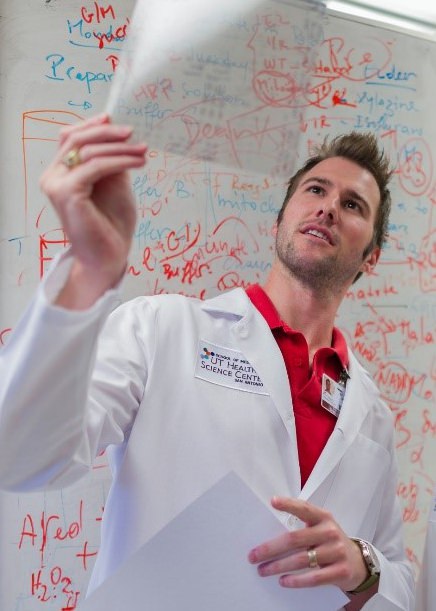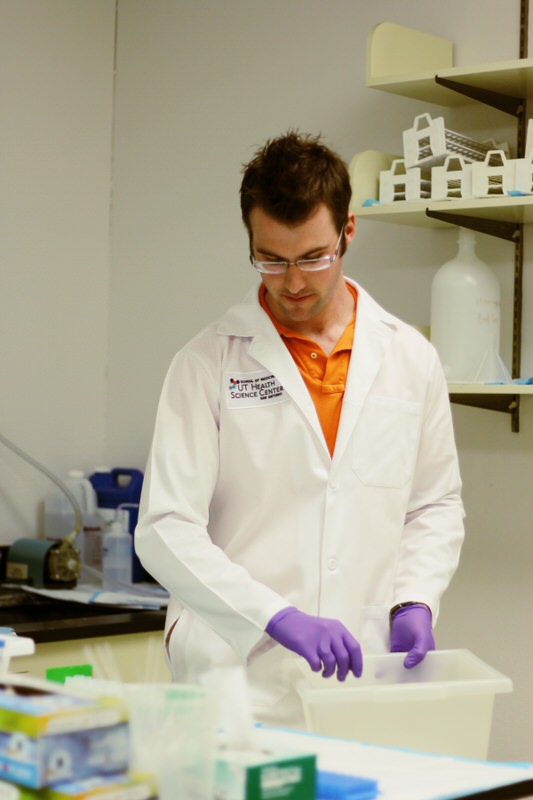Nathan Mitchell Works To Find More Effective Antidepressants For Kids
 Nathan Mitchell always knew he was interested in research which is why he pursued a B.S. in neuroscience at Texas Christian University (TCU).
Nathan Mitchell always knew he was interested in research which is why he pursued a B.S. in neuroscience at Texas Christian University (TCU).
At TCU, he commenced a project evaluating the potential neurotoxic effects of aspartame, a common artificial sweetener, in rats with compromised blood to brain barriers, a condition which can occur in patients suffering from hypertension and diabetes.
“I always found myself attracted to research…. I just wanted to know how the world really works. I would get an idea in my head and feel compelled to chase down the answer,” he said.
After he graduated, Mitchell worked as a histology technician at UT Southwestern Medical Center where he gained an appreciation for cellular biology and pathology.
In 2011, Mitchell applied to the Graduate School of Biomedical Science at the UT Health Science Center at San Antonio.
Mitchell, a graduate student in the Department of Physiology, was drawn to the research in Dr. Lynette Daws’ lab because of his interest in psychiatric disorders.
 “Some people say that depression is just in your head, but I had a professor in undergrad who responded that a brain tumor is also in your head,” he said. “At that time, I began to view psychiatric disorders as a psychological
“Some people say that depression is just in your head, but I had a professor in undergrad who responded that a brain tumor is also in your head,” he said. “At that time, I began to view psychiatric disorders as a psychological
and physiological condition.”
In the Daws’ lab, Mitchell is working to develop new antidepressants that will treat childhood and adolescent depression more effectively.
“We serendipitously discovered antidepressants in the 50’s and since then haven’t innovated any new drugs that are more effective than the ones initially discovered. As well, no drugs were developed to treat depression in children.” he said.
 He explained that many commonly prescribed medications today were not produced for children and that children can react differently to these medications than adults.
He explained that many commonly prescribed medications today were not produced for children and that children can react differently to these medications than adults.
“The most commonly prescribed antidepressants, like Prozac, enhance serotonin transmission by blocking serotonin transporters. Think of a serotonin transporter as a vacuum cleaner for active serotonin in your brain. By blocking the avacuum cleaners’ for serotonin, we can increase the level of serotonin so it may produce therapeutic effects. Unfortunately, these drugs are often not effective in kids,” he said. “However, we’ve found another type of avacuum cleaner’ for serotonin called the organic cation transporters, which appear to be promising new targets for antidepressants.”
Mitchell explained that his research has shown that using preclinical models which test for antidepressant effects, juvenile mice respond better to drugs that block organic cation transporters than adults.
“Clinically, we may be giving the wrong drugs to children,” he said. “Frankly, kids are not like adults, which may explain why the drugs prescribed are underperforming.”
 Mitchell is passionate about researching psychiatric
Mitchell is passionate about researching psychiatric
disorders because of the devastating social and economic impact that these disorders have on our society.
“Depression is a terrible disorder and is on the rise, it is predicted to be the second leading cause of disability in 2020,” he said.
When he’s not in the lab, Mitchell can be found gardening.
“I like being outside and [with gardening] you can see instant results,” he said. “In a weekend, you can clear your garden, plant something new and walk away with a real since of accomplishment. In science you can be working on a project for years before you see the same response. I like that immediate result with gardening; however, science will always be my main passion. It is hard to describe the excitement from
completing a successful experiment. For a moment, you can see a glimpse of how the world really works.”
 This article was written by Charlotte Anthony, marketing specialist at the Graduate School of Biomedical Sciences at UT Health San Antonio. This article is part of the “Meet The Researcher” series which showcases researchers at the Graduate School of Biomedical Sciences at University of Texas Health Science Center San Antonio.
This article was written by Charlotte Anthony, marketing specialist at the Graduate School of Biomedical Sciences at UT Health San Antonio. This article is part of the “Meet The Researcher” series which showcases researchers at the Graduate School of Biomedical Sciences at University of Texas Health Science Center San Antonio.
